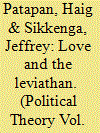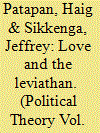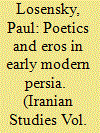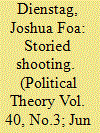|
|
|
Sort Order |
|
|
|
Items / Page
|
|
|
|
|
|
|
| Srl | Item |
| 1 |
ID:
085003


|
|
|
|
|
| Publication |
2008.
|
| Summary/Abstract |
Hobbes's understanding of love, and its significance for his political thought, has received insufficient attention. This essay contends that Hobbes has a consistent and comprehensive teaching on love that directly repudiates what he regards as the Platonic teaching on eros. In attacking the Platonic idea of eros, Hobbes undermines a pillar of classical political philosophy and articulates a significant aspect of his new understanding of the passions in terms of power, which is itself a critical part of his new political science most famously presented in Leviathan
|
|
|
|
|
|
|
|
|
|
|
|
|
|
|
|
| 2 |
ID:
085338


|
|
|
|
|
| Publication |
2008.
|
| Summary/Abstract |
Hobbes's understanding of love, and its significance for his political thought, has received insufficient attention. This essay contends that Hobbes has a consistent and comprehensive teaching on love that directly repudiates what he regards as the Platonic teaching on eros. In attacking the Platonic idea of eros, Hobbes undermines a pillar of classical political philosophy and articulates a significant aspect of his new understanding of the passions in terms of power, which is itself a critical part of his new political science most famously presented in Leviathan.
|
|
|
|
|
|
|
|
|
|
|
|
|
|
|
|
| 3 |
ID:
092947


|
|
|
|
|
| Publication |
2009.
|
| Summary/Abstract |
The poet Muhtasham K sh n? (d. 1588) is today known primarily for his strophic elegy on the martyrdom of Imam Husayn at Karbal , but such devotional poems make up only a tiny fraction of large oeuvre. Far more substantial are two works of a very different tenor, Nuql-i 'Ushsh q (The Lover's Confection) and Ris la-yi Jal liyya (The Glorious Epistle). Using an innovative combination of prose and poetry, these works tell the story of the poet-narrator's stormy affairs with, respectively, an upper-class courtesan and a footman attached to a nobleman's house. As part of the larger literary movement known as the maktab-i vuq ' or "realist school," these purported autobiographical accounts of Muhtasham's amorous adventures reveal a sophisticated culture of eros and desire that differs strikingly from the usual representations of the state of literature and the arts under Shah Tahm sp. After situating these works in their historical, literary, and cultural contexts, the article turns to a close analysis of an extended passage from each work to show how Muhtasham integrates lyric poetry, narrative, and setting to depict the pursuit of desire in the urbane world of early modern Persia
|
|
|
|
|
|
|
|
|
|
|
|
|
|
|
|
| 4 |
ID:
113828


|
|
|
|
|
| Publication |
2012.
|
| Summary/Abstract |
A variety of theorists have emphasized the paradox at the center of democratic legal authority, viz., that it cannot be self-derived but must ultimately rest on some extra-legal phenomenon, usually an act of exclusion. John Ford's The Man Who Shot Liberty Valance examines precisely this paradoxical situation and, I argue, actually suggests a novel response that has escaped theorists who have considered the problem in the past. The film's best-known line ("print the legend") in fact represents the opposite of its perspective-which is to carefully deconstruct and reveal (without debunking) the complicated interrelation of law and power in the formation of any state. Rather than undermining democratic authority, we can be strengthened, if sobered, by the revelation that law is not self-sustaining. By setting the facts alongside the legend, the film perpetuates the fortuitous moment of state formation. What constitutes the state, then, is neither law nor power, but rather the matrix of representation that creates the relationship between them-here a film, but perhaps, more generally, a sustaining narrative.
|
|
|
|
|
|
|
|
|
|
|
|
|
|
|
|
|
|
|
|
|